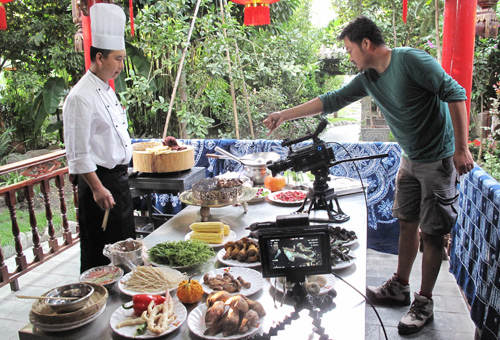|
 |
|
POSITIONING: A photographer rearranges dishes on a table during the filming of the documentary A Bite of China (FILE) |
Home cooking
Another distinguishing feature of the show is its unique look into the everyday lives of the Chinese people. No matter what dish the documentary introduces, it always tells a true story of how a common Chinese family relates to a specific food. Fans of the show commented on the Internet that A Bite of China is "extensive," "real," and "impressive."
One episode featuring cured meat, a delicacy in central China, is tied to a woman's memory of her mother in a mountainous village of Hunan Province. The mother would prepare enough cured meat to sustain her family through the winter when there were no fresh vegetables. The documentary shows a woman rising before dawn to prepare a dish of fried bacon and dried turnip for her daughter's lunch. After breakfast, she walks with her daughter along the way to a distant village school, stopping at daybreak to tell the young girl, "It is bright now. The way ahead is not difficult to walk. You can do it by yourself."
The segment reflects the deep, universal love of a mother for her daughter. It also shows how food can unite an ordinary family together around a dinner table.
Locally made
All of the Chinese foods shown in the documentary are made by traditional means. Diversified local cuisines have formed throughout its 5,000-year history in the vast Chinese territory.
Ji Shaoting, a Xinhua News Agency correspondent, is a "foodie" and loyal viewer of the documentary. She recalled the feeling of nostalgia during a scene in which a steamed bun is filled with fricassee, a delicacy of Shaanxi Province. "My mouth watered when watching the show. I miss my hometown so much," Ji said.
Ji grew up in Xi'an, capital of Shaanxi Province. She couldn't be more familiar with her hometown's famous dish. Having lived in Beijing for many years, Ji felt homesick when she saw her favorite food in the documentary.
Though people can find their hometown's fare in large cities like Beijing, these foods cannot replace their memories of home. Many people believe that authentic local dishes can only be prepared in traditional ways using the material and water of the local place.
Traditional methods of cooking are often environmentally sustainable. For example, the documentary shows how farmers of the Shangri-La area in Yunnan Province carefully restore the land pits from which they dig mushrooms called tricholoma matsutake to avoid destroying the surrounding hyphae. Fishermen of Chagan Lake in Jilin Province use large mesh nets while fishing to make sure they get big fish and give little fish a way out so as to ensure the sustainability of fish resources.
Despite the changes China has undergone over the past 30 years, people respect the ancient wisdom of a balanced relationship between human and nature. This idea is presented in full by the documentary.
Liu Wen, General Supervisor of CCTV's Documentary Channel, said at a seminar on May 30 that the second season of A Bite of China is going into production at the end of the year. The series will continue with the original season's storytelling style.
"The channel serves as a window which allows the world to better understand China. The documentary aims to help a global audience not only appreciate Chinese cuisine, but also learn about Chinese custom and culture behind it," Liu said.
Email us at: baishi@bjreview.com | 